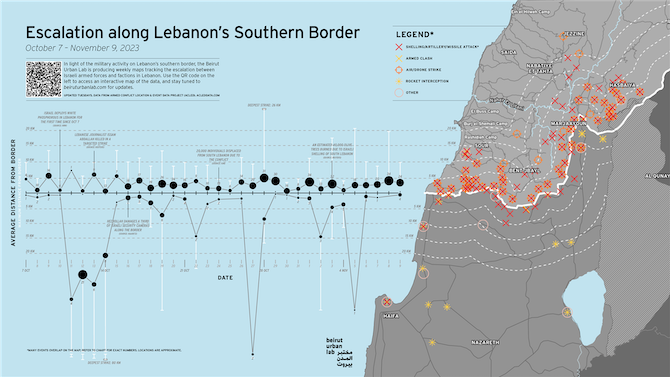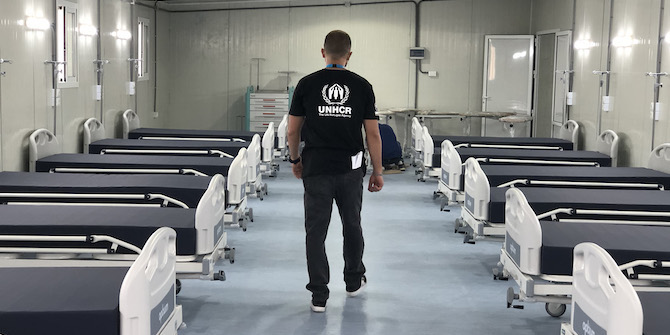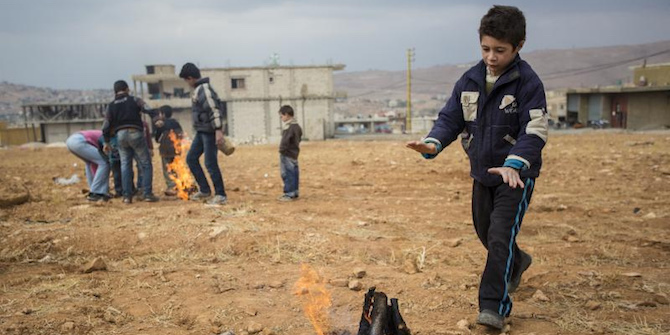by Anne Kirstine Rønn

On 5 November 2023, a car was hit by an Israeli drone strike on the road between the villages of Aitaroun and Ainata in South Lebanon. Three girls aged between 10 and 14 and their grandmother were killed in the attack, while their mother, who was driving the car, sustained severe injuries.
Since 8 October, increased fighting has taken place along the Lebanon-Israel border between Hezbollah and its allied on the one side and the Israeli military on the other. Despite fears of escalations, the fighting has so far remained largely within the rules of engagement, which have prevailed since the 2006 war between Israel and Hezbollah. That means the parties have mostly, but not exclusively, attacked military targets within close proximity to the 130 km long demarcation line.
For Lebanon as a whole, the consequences of these attacks may seem relatively minor when compared to the scenario of an all-out war. Yet, this does not imply that the country has got off lightly if fighting remains at the current level. Such an interpretation would dismiss the reality that citizens in the southern regions face.
Prior to the drone strike on 5 November, Israeli attacks had already cost six civilian lives, amongst them Reuters Journalist, Issam Abdallah. On 21 November, another two journalists from the TV channel, Al Mayadeen and their guide were killed in an Israeli bombardment. The attacks on civilians emphasise the state of insecurity in the affected areas. However, to understand the long-term implications of the border conflict, we need to turn our attention to the wider socio-economic levels.
The cross-border fighting has already deteriorated the livelihood of thousands of people in South Lebanon. If the region is to witness additional months of battles, which seems likely at the moment, the socio-economic spillover effects will be significant and difficult to recover from.
First of all, continued fighting is likely to cause prolonged displacement of thousands of people. The Lebanese southern border area is home to about 600,000 citizens, of which 40-60,000 have already left their homes due to fears for their safety. According to figures from The International Organization for Migration (IOM), the number of displacements is escalating.
While the majority of displaced individuals currently live with family members, many others have been forced to rent property, causing a hike in rental prices. In a time of severe economic crisis, $1,500 per month for a two-bedroom apartment is a large expense, and if the fighting continues, some families may therefore be forced to give up renting and return to their houses or stay in temporary collective shelters. So far, over 1000 displaced people are residing in such shelters, but the number might as well rise in the coming weeks and months.
Prolonged displacement will have several long-term consequences for the affected families, including children, whose education will be put on hold. Already now, at least 52 of the 300 schools in south Lebanon are closed due to security issues, while an additional number are out of function because they have been converted into shelters. In total, over 8,000 children are currently out of school due to the border clashes, most of which have already lost years of education due to covid-19 and the economic crisis.
Another factor, which is likely to have long-term consequences for South Lebanon is the loss of agricultural production, which is the main source of income for a large share of the area’s population.
According to The Beirut Urban Lab, there have been 553 Israeli strikes inside Lebanon between 8 October and 9 November, and in several cases Israeli military used white phosphorus, which is particularly damaging to the trees and fields.
In total, 462 hectares of land have been damaged in fires resulting from these strikes, including an estimated 20 hectares of centuries-old olive groves. In general, olive farmers near the border are one of the groups that have suffered particularly large economic losses due to the fighting, as they have been prevented from entering their fields during the annual harvest season, which lasts from start October to mid-November.
To understand how the losses of harvest, crops and farmland in the current border conflict affect the communities of South Lebanon, we can look back at the 2006 war, which threw many farmers into a downward spiral of poverty. The loss of revenues made farmers unable to pay their debt, which in turn prevented them from starting a new cropping cycle the following year. Battling this spiral required millions of support in aid. Today, after four years of economic crisis, farmers in South Lebanon are arguably even more economically vulnerable than they were in 2006.
In conclusion, no matter how the conflict develops in the coming weeks and months, it will leave a significant part of the border region’s residents in need of assistance to return to the livelihood they had before 7 October.
[To read more on this and everything Middle East, the LSE Middle East Centre Library is now open for browsing and borrowing for LSE students and staff. For more information, please visit the MEC Library page.]






